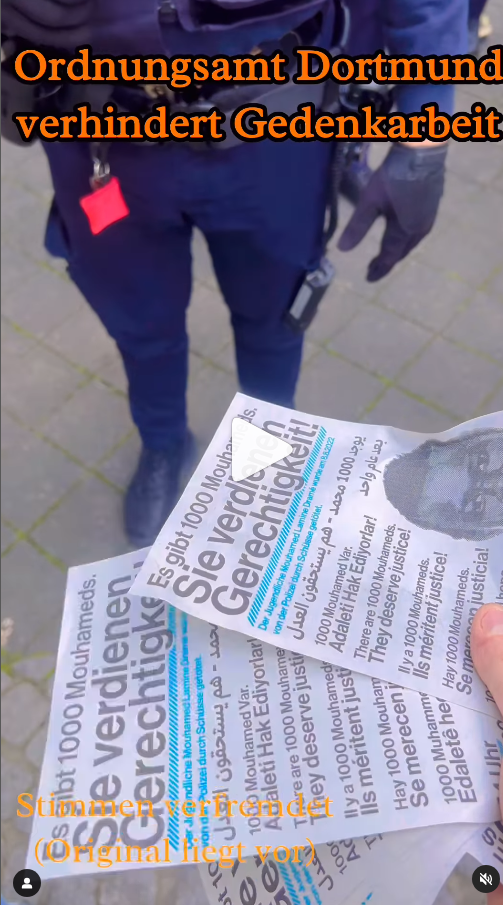This coming Saturday, there will be again a nationwide demonstration in Dortmund for Mouhamed Lamine Drames, who was murdered by the police last year. Mouhamed, who was in an exceptional psychological situation and appeared to have suicidal intentions in a fenced area, was surrounded by a dozen police officers in Dortmund's Nordstadt district and was then first attacked with pepper spray and then executed in under a second, first with a Taser and then five shots from a submachine gun. At no time did Mouhamed pose a danger to other people. Also the deployed cops were not endangered due to the fencing. Following the brutal act, a movement of solidarity with Mouhamed quickly formed and, together with his family, demanded clarification and justice. Of the total of 12 police officers involved in the operation, five are now facing charges.
Now, in the forefront of the demonstration, there has been a case of repression against the activists of the Solidarity Circle Mouhamed. On Tuesday, August 8, the anniversary of Mouhamed's death, the Solidarity Circle called for a commemorative rally, which was to be mobilized with leaflets on the Nordmarkt, the central square in Dortmund's 'Nordstadt'. According to the activists, the group had placed itself explicitly at the edge of the Nordmarkt in order to prevent the police from criminalizing the distribution of the leaflets in advance. The would-be cops of the public order office nevertheless approached the activists. A video, which has meanwhile been viewed more than 500,000 times, shows the situation from the point of view of the attacked activist. The activist tries to discuss calmly and normally with the police officers, who ask him to hand over the leaflets, which is a serious interference in the freedom of speech. When the activist does not comply with this demand, he is violently attacked by the three pseudo-cops, brought to the ground and handcuffed and taken to a nearby public order office where he has to sit in handcuffs for another hour.What particularly shows the position of the beating guards, the activist asks the public order office lackeys beforehand if the violent taking away of the leaflets is the style of the public order office to deal with the murder of a 16-year-old on the day of his death, whereupon one of the uniformed men answers with yes and then attack.
The City of Dortmund has backed its aid cops in the aftermath of the events, claiming that the activist had acted with considerable resistance and that the measure was not questionable because the city's weekly market statutes do not permit the distribution of advertising materials. Another video on Instagram shows meanwhile statements of the public order office explaining to the activist in the situation that the distribution of political leaflets is not prohibited, but only disapproved by the market tenant. The case is in the meantime so well-known that even the West German broadcast reports in two television contributions in the local hour about it where both the attacked activist and a lawyer come to word around the situation to classify. The Freiburger specialist lawyer Patrick Heinemann comes with the WDR to the conclusion that the behavior of the office of order violated the right to free expression and also the following "detention" by the office of order is not legal. In general, it is an absurd straw man to talk about putting commercial advertising materials on the same level as political leaflets and using one to ban the other.
It can be concluded that the bourgeois state in Dortmund meanwhile evaluates the situation around the protests about the murder of Mouhamed in such a way that it has to go more on the offensive. Because the situation with the police is so tense, especially in the Dortmund Nordstadt, he resorts to his auxiliary forces in the form of the Office of Public Order to cover the fight for justice and clarification for Mouhamed with repression. They will not succeed, because the struggle against police violence and racism resonates more and more with the masses, who no longer want to put up with the daily harassment. This is also shown by the struggles for Oury Jalloh and Adel B., which continue to this day.











